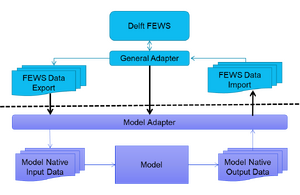Delft-FEWS/en: Unterschied zwischen den Versionen
(Die Seite wurde neu angelegt: „Delft-FEWS“) |
(Die Seite wurde neu angelegt: „==TalsimFEWSAdapter==“) |
||
| Zeile 14: | Zeile 14: | ||
==TalsimFEWSAdapter== | ==TalsimFEWSAdapter== | ||
'''TalsimFEWSAdapter''' is a Delft-FEWS "Model Adapter" for Talsim-NG implemented in Python. It makes it possible to perform (automated and/or operational) simulation runs with Talsim-NG from within Delft-FEWS and to visualize, manage and further process the simulation results in Delft-FEWS. | |||
'''TalsimFEWSAdapter''' | |||
[[Datei:Delft-FEWS ModelAdapterWorkflow.png|mini|300px|rechts]] | [[Datei:Delft-FEWS ModelAdapterWorkflow.png|mini|300px|rechts]] | ||
General workflow of an adapter run: | |||
* | * Data export from FEWS | ||
* | * Data preprocessing / conversion | ||
* Simulation Talsim-NG | * Simulation with Talsim-NG | ||
* | * Result postprocessing / conversion | ||
* | * Data import back into FEWS | ||
TalsimFEWSAdapter currently supports the following features: | |||
TalsimFEWSAdapter | * Read and process timeseries in FEWS PI Timeseries format | ||
* | * Read and process model parameters in FEWS PI Parameters format | ||
* | * Read and process state information in FEWS PI State format | ||
* | * Read and process information in FEWS PI Run format | ||
* | * Carry out a simulation with Talsim-NG | ||
* | * Convert simulation results to FEWS PI Timeseries format | ||
* | |||
This makes it possible to carry out Talsim-NG simulations for which Delft-FEWS not only specifies the input climate time series, but also parameters for the initial conditions such as soil moisture and/or baseflow. | |||
Furthermore, it is possible to set up an override from within Delft-FEWS for storage elements contained in the Talsim data set, such as reservoirs, so that the operating rules stored in the Talsim data set can be overridden by predefined storage releases. | |||
Version vom 22. April 2024, 12:56 Uhr
Delft-FEWS is an operational, model-based system for flood forecasting and runoff prediction developed by Deltares and used worldwide.
Delft-FEWS is freely available software that efficiently handles large amounts of forecast data, integrates the latest observations with the most recent meteorological forecasts, and provides for consistent data quality, standardized work processes, visualization, and reporting. Delft-FEWS can orchestrate massive computations on dedicated hardware, in the cloud, or both, and allows for remote collaboration between multiple experts working and interacting with the same data.
Delft-FEWS consists of a sophisticated set of configurable modules which can be combined and customised to the specific requirements of an individual organisation. Due to its flexible and modular structure, Delft-FEWS is suited to support a broad range of applications, such as day-to-day operational management, real-time control, flood forecasting and warning, water quality monitoring, reservoir management, hydropower, navigation, groundwater, droughts, and dike strength monitoring.
The open architecture of Delft-FEWS makes it easy for any organization to connect their own data and models, and tailor the system to their own needs. The models known and available within the organization can easily be integrated, without any expensive development of new models. The platform provides a wide range of displays to visualize many types of data, such as scalar and gridded data, vectors, wave spectra, and longitudinal profiles. Furthermore, Delft-FEWS contains a large set of data processing modules for common processing steps taken in hydrological and hydrodynamic forecasting. The data can be verified, used in reports, and archived for later use as well as distributed through a web-API for end users and publication on web pages.
TalsimFEWSAdapter
TalsimFEWSAdapter is a Delft-FEWS "Model Adapter" for Talsim-NG implemented in Python. It makes it possible to perform (automated and/or operational) simulation runs with Talsim-NG from within Delft-FEWS and to visualize, manage and further process the simulation results in Delft-FEWS.
General workflow of an adapter run:
- Data export from FEWS
- Data preprocessing / conversion
- Simulation with Talsim-NG
- Result postprocessing / conversion
- Data import back into FEWS
TalsimFEWSAdapter currently supports the following features:
- Read and process timeseries in FEWS PI Timeseries format
- Read and process model parameters in FEWS PI Parameters format
- Read and process state information in FEWS PI State format
- Read and process information in FEWS PI Run format
- Carry out a simulation with Talsim-NG
- Convert simulation results to FEWS PI Timeseries format
This makes it possible to carry out Talsim-NG simulations for which Delft-FEWS not only specifies the input climate time series, but also parameters for the initial conditions such as soil moisture and/or baseflow.
Furthermore, it is possible to set up an override from within Delft-FEWS for storage elements contained in the Talsim data set, such as reservoirs, so that the operating rules stored in the Talsim data set can be overridden by predefined storage releases.
